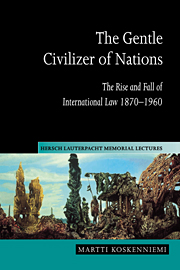Book contents
- Frontmatter
- Contents
- Preface
- List of abbreviations
- Introduction
- 1 “The legal conscience of the civilized world”
- 2 Sovereignty: a gift of civilization: international lawyers and imperialism, 1870–1914
- 3 International law as philosophy: Germany 1871–1933
- 4 International law as sociology: French “solidarism” 1871–1950
- 5 Lauterpacht: the Victorian tradition in international law
- 6 Out of Europe: Carl Schmitt, Hans Morgenthau, and the turn to “international relations”
- Epilogue
- Bibliography
- Index
4 - International law as sociology: French “solidarism” 1871–1950
Published online by Cambridge University Press: 06 July 2009
- Frontmatter
- Contents
- Preface
- List of abbreviations
- Introduction
- 1 “The legal conscience of the civilized world”
- 2 Sovereignty: a gift of civilization: international lawyers and imperialism, 1870–1914
- 3 International law as philosophy: Germany 1871–1933
- 4 International law as sociology: French “solidarism” 1871–1950
- 5 Lauterpacht: the Victorian tradition in international law
- 6 Out of Europe: Carl Schmitt, Hans Morgenthau, and the turn to “international relations”
- Epilogue
- Bibliography
- Index
Summary
“Here is a tranquil and charming village in a small peaceful State: its canals slumber in the calm of justice, interrupted only by a horizon of mountains whose snowy peaks inspire properly elevated thoughts. This is the chosen seat for elected international public power.” In this setting (which is not difficult to recognize as Rousseau's imaginary Geneva) we see the Parliament of Nations, “this immense and luxurious building, with spacious galleries, rich bibliographies, numerous bureaux of commissions,” together with a “smaller, though still imposing palace of the International Governmental Commission, or, more properly, of the Administrative Commission.” On both sides of a large boulevard there arise the offices of the ministries: an International Administration of Finances, a Customs Commission, a Monetary and Finances Commission, the headquarters of international postal administration, railways, straits, the great international rivers … There is also the building of the Ministry of Colonies “for care over races under trusteeship has been confided to the Society of Nations itself.” Still other facades appear: “at the end of the avenue, perpendicular to other buildings, very visible and in a much more sombre style lies that of the Directorate of International Armed Forces.” “But the veritable engine of the international society is the administration of justice. Here it finds the preponderant place which it has lost in so many States … The International Court of Justice, chosen initially from lists of candidates proposed by States, has become thereafter completely independent.
- Type
- Chapter
- Information
- The Gentle Civilizer of NationsThe Rise and Fall of International Law 1870–1960, pp. 266 - 352Publisher: Cambridge University PressPrint publication year: 2001

